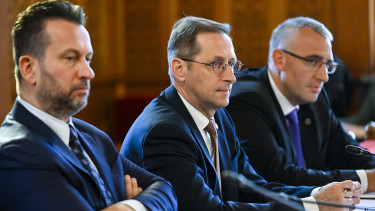“We see Hungary as a gateway to Europe’s future growth”
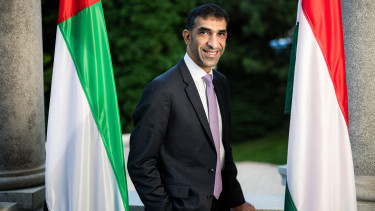
During your visit to Budapest, you will meet several high-ranking Hungarian government officials, including our Minister of Foreign Affairs, Péter Szijjártó. Could you tell us more about the purpose of these meetings and what you hope to achieve through these discussions?
It’s really good to be back in Budapest. As you mentioned, I will meet the Minister of Foreign Affairs and other key ministers as well. Over the last two years, our bilateral relations have been progressing very well. In the last three years, we’ve seen excellent leadership from both sides, and soon we will have another high-level meeting. This shows how both leaders are committed to working together. This close relationship allows us to explore new ways of cooperation.
Minister Szijjártó and our leadership have a very strong personal relationship that even predates their current positions. This helps us push forward our shared agenda: increasing bilateral trade between our two nations, boosting investments on both sides, ensuring businesses are growing, and identifying untapped opportunities.
We previously discussed with Hungary’s Minister of Interior how Hungary was one of the EU member states that strongly supported and officially submitted a request to the European Commission to start bilateral negotiations with the UAE. We are also working together under the WTO framework, following the 13th Ministerial Conference we hosted two years ago. At the same time, we continue pushing forward bilateral trade and seeing concrete results. During this visit, we will also discuss a lot of specific projects.
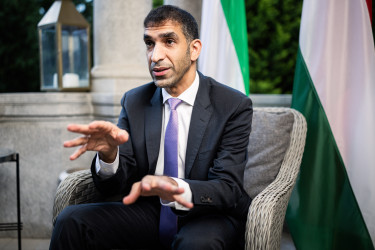
How would you describe the relationship between Hungary and the United Arab Emirates?
It’s very good and becoming even more flourishing.
In your view, what factors have contributed to this flourishing relationship, and what do you see as the main drivers behind its continued growth?
If you look at the last few years, you see that investments are growing, engagements are increasing, and there are many business delegations traveling back and forth. This reflects the depth of our cooperation.
How do you assess the trade dynamic between Hungary and the UAE? It’s at a high point now. Do you think it has peaked, or is there still room to grow?
There is absolutely room to grow. We see Hungary as an industrial nation with huge potential, strong capabilities, and significant trade opportunities. There are many areas where we can expand. For example, food, vegetables, and agricultural products will for sure be one of the main markets.
Electronics is another important area, and aerospace – both equipment and spare parts – is becoming a key field where Dubai is positioning itself as a hub. Pharmaceuticals and automobiles are also significant, especially since the UAE is one of the main re-export hubs for cars. These are just some of the sectors where we see great potential to work together.
Beyond trade, are there other priority sectors for cooperation?
Yes. Before talking about trade, we always look at two main areas for impactful investment: energy and digitalization.
In energy, we see huge potential from both sides and are exploring major investments. Digitalization is another key area, including data centers, infrastructure, and technology projects. Alongside these, we are also looking at agriculture, cosmetics, automobiles, and electronics – all areas where Hungary has strong expertise.
Another focus is bringing more Hungarian industries to the UAE, using our country as a platform to access larger regional markets.
A number of significant agreements have recently been signed between Hungary and the United Arab Emirates. What opportunities do you think these agreements will create for strengthening existing trade relations and fostering successful future economic partnerships?
In the first half of this year, we saw strong growth – almost 29% compared to last year’s numbers. We’ve started serious discussions in several areas: energy, digitalization and data centers, infrastructure, and industrial investments.
Things are moving forward, but I don’t want to announce details until the commitments are finalised.
When you talk about energy, do you mean commodities or infrastructure and technology as well?
Both. It’s about commodities and infrastructure investments, including renewables, LNG, and networks.
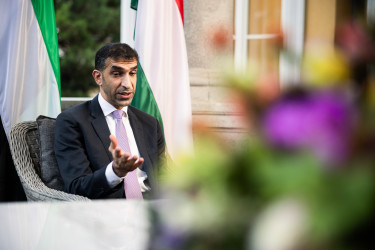
You mentioned that there has been strong growth in trade between the two countries this year, whereas last year there was a slight decline. What factors caused this setback?
It was mostly due to a couple of large deals that were concluded in earlier years but didn’t happen last year. Another factor was the geopolitical disturbances that affected supply chains globally.
But now we are back on track. We also need to remember that our statistics mostly count trade in goods, while services are becoming increasingly important. In the future, we will integrate services into our trade reporting, which will give a fuller picture of the economic relationship.
What is your view on the role of the CEPA agreement, and what opportunities does it present to Hungary and the UAE?
CEPA will be a game-changer, not only for UAE–Hungary relations but also for UAE–EU relations. Our bilateral non-oil trade with the EU is around 68 billion dollars. Last year, we saw growth of over 3.5%.
This trade deal will remove many barriers and tariffs, facilitate investments in services and other sectors, and open new opportunities. The UAE has historically been a major investor in the EU, with cumulative investments exceeding 350 billion dollars. This year alone, we made significant investments in France, Italy, Hungary, Spain, and we are expanding in Germany as well.
We see the EU as a huge market, and CEPA will help us grow further. In today’s complex geopolitical environment, where global trade is shifting, like-minded nations are forming alliances. CEPA fits into this trend and will help us build closer cooperation.
Does the UAE view Hungary primarily as a target for investment, or as a strategic partner within the EU?
Hungary is a friend and ally. You have the talent, the strategic location, and the industrial capabilities we want to work with. Your leadership is forward-looking, which will open many opportunities between the UAE and the broader EU.
What is your view on the future of globalisation and trade? In a time when major global players are announcing new tariffs and the EU is introducing trade barriers against China and other countries, what does the future hold? Will we still have a rule-based trading order similar to that under the WTO, or will it be completely different?
The world is changing, and we must acknowledge that. These changes will affect global trade profoundly.
- Several factors will shape the future: First, technology – for example, AI is already helping companies adapt to new tariffs and trade rules.
- Second, trade finance – new financing methods will transform how trade is conducted.
- Third, supply chains – routes are changing completely.
Trade moves like water: no matter how you try to control it, it will find a way forward. That’s exactly what will happen with global trade.
We are moving from one global rule-based system to a network of alliances. These alliances will be interest-based and focused on specific sectors rather than covering everything. Countries will form customized partnerships, creating interconnected networks instead of one unified global system.
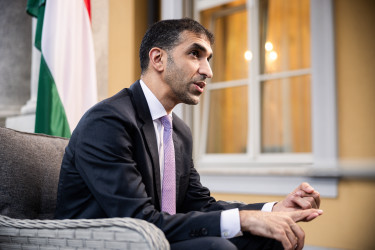
You compared global trade to a flowing river that always finds its path forward. To what extent do you think trends such as onshoring, reshoring, and friendshoring will influence the course of this river in the coming years?
Reshoring, nearshoring, partnership alliances, and interest-based systems will all influence trade. At the same time, we need an overarching umbrella like the WTO to provide guidance and prevent fragmentation.
Earlier you mentioned the Eagle Hills real estate project in Rákosrendező, Budapest. There were some concerns earlier this year. Could that scare away UAE investors, or is it business as usual?
I will meet the mayor of Budapest tomorrow to discuss this directly. There have been some misunderstandings we want to clarify.
First, we are not planning to build high-rise towers, as some rumors suggested. Second, greenery will be a key part of the project, with more than 35-40% of the area dedicated to green spaces – even higher than previously announced.
We are also working closely with local Hungarian investors who will contribute to the project. We want to be transparent and make sure everyone understands our plans correctly.
This project is part of a long-term relationship. Even if this particular development doesn’t proceed exactly as planned, we are committed to continuing investments in Hungary, especially in hospitality and real estate.
The like-minded leadership between our nations ensures this relationship will continue to grow.
Finally, what is your vision for the future development of the partnership between Hungary and the United Arab Emirates, and how do you see it evolving in the years to come?
I would like to highlight the nature of our relationship. It’s both futuristic and pragmatic: we plan with vision, but we take concrete actions to develop our nations.
In international relations, we customize our approach based on our people’s needs and interests. Our focus is always on delivering prosperity to our citizens.
This includes investments, trade, tourism, digitalization, and infrastructure development. I am very confident that our partnership will continue to bring prosperity and growth to both nations and our regions.
Cover photo: Portfolio
A cikk elkészítésében a magyar nyelvre optimalizált Alrite online diktáló és videó feliratozó alkalmazás támogatta a munkánkat.


